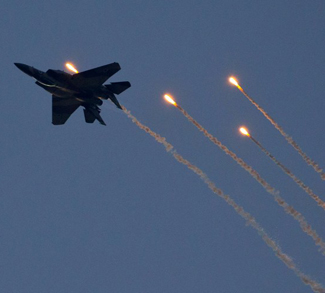Summary
This past week, Iran noticeably softened its anti-West rhetoric, and European negotiators hinted that Iran may cooperate and abandon its nuclear program. Meanwhile, Israel conducted a massive military exercise simulating a mock attack on Iran, and the Bush administration has begun funneling $500m towards Iranian insurgency groups. This seemingly contradictory events must be viewed as part of the brinkmanship game being played out by Iran and the West, and which will become ever more tense until Bush’s term expires in November.
Analysis
The details remain confidential regarding the Iranian response to the latest and most generous offer from the so-called 5+1 (Germany and the five permanent UN Security Council members). However, European and Iranian diplomats have struck reservedly optimistic chords of late, and even American officials have made their curiosity known. Is this, then, the beginning of a detente?In many respects the terms of the 5+1 offer are generous: a light-water nuclear reactor with fuel supply, a pathway to WTO membership and international markets, and assistance in communications and agriculture modernization. Even so, the 5+1 offer does not address the crux of the problem, which is Iran’s desire for national security. From the point of view of the Iranian regime, the only serious protection against an American-inspired coup or attack is a nuclear weapon or a formal non-aggression pact. Since the 5+1 offer includes no such pact, Iran’s seeming interest can be understood as a feint to gain time and show goodwill so as to slow momentum and dissolve the political unity of its opponents.
Yet it also reflects the effectiveness of international pressure. Iran clearly fears the threat of an Israeli airstrike and/or US-funded covert activity. A spate of recent articles in Iranian newspapers lay out the regime’s defense strategy, which includes long-range missile retaliation, oil production disruption, use of its proxies in Lebanon and Iraq, and the formation of local defense councils and militias for urban warfare. It should be noted that this is not the first time Iran has bowed to international pressure. The American-produced National Intelligence Estimate, leaked to the public last year, states with “high confidence” that Iran suspended uranium enrichment for five years after President Bush’s “axis of evil” speech in 2002.
The coming months will be highly fraught as the Bush Presidency winds down, and as neoconservatives in the administration attempt to seize the final opportunity to effect regime change in Iran. For logistical and economic reasons, the odds of a full-blown ground invasion are negligible, and the odds of an Israeli airstrike are low, but the $500m allocated towards destabilizing Iran could provoke major retaliation by Iran against Iraqi targets, or via Hezbollah and Hamas against Israel. In any case, there is little doubt that a comprehensive treaty in which Iran agrees to relinquish its quest for nuclear weapons will not be signed until a new American president takes office.
Ian Speigel is a contributor to Geopoliticalmonitor.com



